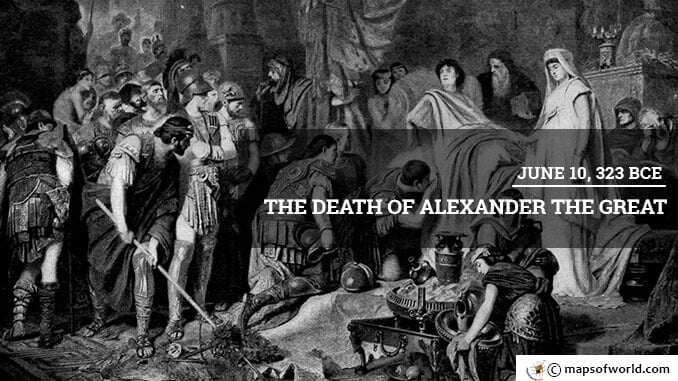Late in the evening, after battling an unknown illness for nearly two weeks, Alexander the great quietly died at the royal palace in the heart of Babylon. After almost a decade of conquest, the Macedonian king reigned over much of the Eastern hemisphere and his death, some argue, did more than anything else to create the dividing lines between European, African and Asian civilization we know today. At the tender age of thirteen, in front of his father King Phillip II and several nobles of the Macedonian court, Alexander tamed a spirited horse named Bucephalus. Having guaranteed he could break the mount’s spirit despite the failures of men several years his senior, his triumph was greeted with more than just surprise and applause – the young man’s strength was recognized immediately. Pulling Alexander aside after he dismounted, the proud Phillip infamously told the prince, “My boy, you must find a kingdom large enough for your ambitions. Macedonia is just too small for you.” When he assumed the throne, Alexander III would go in search of just that. Having swept out of the highlands of Macedon to solidify the Greek peninsula after his father’s death, he turned his attention toward the kingdoms to the south and east in 334 BCE. From his base in Pella, he soon conquered modern Turkey before hugging the Mediterranean coast to take Egypt from the Persian Empire by the end of 331 despite often commanding smaller armies on unfamiliar terrain. Wherever Alexander went, victory soon followed. Moving through what is today Syria and Iraq, he relentlessly pursued Darius III, the Great King of Persia, feeling it his responsibility to avenge Greek losses by Darius I and Xerxes. Moving down the royal road after taking Babylon and Susa, he led his army in the plunder of Persepolis. Now King of All Asia – a fact cemented by Darius III’s murder at the hand of his captors – Alexander turned his men toward the Endless Ocean. After another five years of battle, much of it in the mountainous Hindu Kush, Alexander the Great finally made a miscalculation: his men wanted to go home. Angry to be asked to turn around despite being just three months’ march from his ultimate goal, he relented. His kingdom, now at its largest boundary, extended over more than two million square miles from northern Greece to western India – land without a proper heir. The bloody struggle that followed lasted more than 40 years. Without a true heir – one of Alexander’s wives was pregnant with a son at his death – the vast kingdom would eventually be divided amongst four of Alexander’s generals and one of his bodyguards: Macedonia and Greece to Cassander, Egypt to Ptolemy, Thrace to Lysimachus, Syria and the eastern lands to Seleucus and Asia Minor to Antigonus. The Successors (Diadochi in Greek) would fight amongst each other – and kill Alexander’s son and brother – until final borders were established around 281 BCE, shortly before the rise of the Roman Empire. The location of Alexander’s tomb is the only lasting mystery. Having been put on display by his servant Perdiccas, the king’s body – an important symbol of power in those days – was stolen by Ptolemy in Syria and eventually laid to rest in Alexandria by his son, Ptolemy II. The tomb ended up being something of a tourist attraction: Cleopatra even brought Julius Caesar to it when he visited in 45 BCE. However, urban riots in the late 3rd Century CE led many to believe it destroyed, leaving legends as the only source for where the great warrior-king rests today.
June 10: 323 BCE – The Death of Alexander the Great
Late in the evening, after battling an unknown illness for nearly two weeks, Alexander the great quietly died at the royal palace in the heart of Babylon. After almost a…
818
